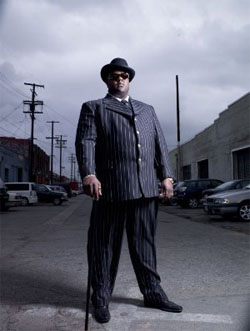Over a decade after his death in a drive-by shooting, Christopher Wallace (better known as the Notorious B.I.G.) maintains his storied place in the hip-hop lexicon. His feud with friend-turned-rival Tupac Shakur came to define ‘90s rap, and he was one of the few MCs who was able to balance mainstream radio appeal and street credibility.

Notorious, Fox Searchlight’s biopic of the former king of New York rap, stays faithful to his iconic legacy and larger-than-life personality. However, the film fails to deliver an honest exploration of the artist’s turbulent life, reducing his story to the worn-out narrative of one man’s journey from rags to riches.
The film focuses primarily on telling Wallace’s life story, from his Brooklyn upbringing under the watchful eye and harsh tongue of his mother (an emphatic Angela Bassett) to his place at the top of the hip-hop game. Making use of narrative voice-overs, the film moves along briskly and manages to condense Wallace’s life into a fairly straightforward progression of events.
This makes Notorious easy to watch, but it shrinks Biggie’s story into the pre-cut Hollywood mold of an underprivileged talent who miraculously rises to the top before crashing violently to the bottom. Big’s life and career altered the landscape of American pop culture, but his story as told by Notorious feels hackneyed and cliché. To illustrate Wallace’s astronomical rise in popularity following the release of his first single, director George Tillman Jr. turns to a musical montage of pop charts and magazine covers—a sure sign of lazy directing.
Though Tillman squeezes the storyline into a cinematic archetype, the character of Biggie Smalls nonetheless shines through clearly. In his role as Notorious B.I.G., unknown Brooklyn rapper Jamal “Gravy” Woolard captures both the charismatic showmanship of a born entertainer and the cold-hearted ruthlessness of a man determined to improve his lot at all costs. Discovered in an open casting call, his droopy-eyed scowl and deep, nasal voice serve as virtually flawless imitations of the original. Woolard’s rapping chops are impressive, and his on-screen renditions of the rhymes we all know by heart are almost good enough to make us forget that they’re re-recordings.
Tillman does a great job of visually capturing Biggie’s larger-than-life stature. In several live concert scenes, the portly Woolard’s enormous frame is silhouetted against smoky spotlights, filling up the screen in the same way that Big’s thick, lively grumble dominates tracks. Tillman uses a shaky hand-held camera to capture the raw energy and unpolished brilliance of Biggie’s early rap battles on the streets of Brooklyn. Coupled with Woolard’s fantastic vocal performance, these musical scenes produce some of the film’s best moments.
While Woolard is a perfect physical and lyrical fit for the role, he is a rapper who turned to acting specifically for this part, and he proves unable to carry the film all the way to its end. The film takes special note of Biggie’s emotional development on his journey to stardom, portraying Wallace as tormented by his mother’s battle with cancer and by his troubled romantic and personal life. In the face of so much emotional confusion, Woolard sometimes seems overwhelmed. His portrayal of the rapper is convincing, but his displays of inner turmoil aren’t.
The real life Christopher Wallace was haunted by the elusive goals of personal and artistic fulfillment, but Tillman lets Woolard’s character find eventual satisfaction in his family and in his progression toward manhood. Right before his death, surrounded by friends and family, he prays, simply, “Dear God, thank you.” Wallace probably died without such fulfillment, but it’s satisfying nonetheless to see Woolard achieve it.
Dramatic shortcomings aside, Woolard isn’t the only cast member who manages to accurately portray a contemporary public figure. Derek Luke’s Sean “Puffy” Combs is almost as flashy and vain as P. Diddy himself, and Naturi Naughton gives a rousing rendition of the voluptuous and fiery female MC Lil’ Kim. But the real standout is Anthony Mackie, whose performance as Tupac Shakur is both convincing and respectful toward the rapper’s legend.
Despite its flaws, Notorious ultimately succeeds in narrating the rise and fall of a hip-hop icon whose career helped define an era. Though its attempt to project an inspirational message (“No dream is too big!”) rings hollow, Woolard’s spot-on portrayal of Big’s enormous personality and loose-lipped, deep rhymes should help preserve the rapper’s gigantic legacy. Though told through clichés, Notorious provides a poignant and accurate portrait of a legend. It’s not perfect, but it’s a fitting life after death.





